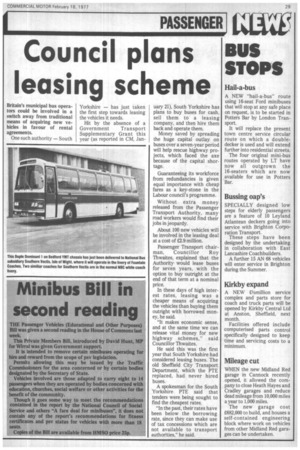Council plans leasing scheme
Page 31

If you've noticed an error in this article please click here to report it so we can fix it.
Britain's municipal bus operators could be involved in a switch away from traditional means of acquiring new vehicles in favour of rental agreements.
One such authority — South Yorkshire — has just taken the first step towards leasing the vehicles it needs.
Hit by the absence of a Government Transport Supplementary Grant this year (as reported in CM, Jan uary 21), South Yorkshire has plans to buy buses for cash, sell them to a leasing company, and then hire them back and operate them.
Money saved by spreading the huge capital outlay on buses over a seven-year period will help rescue highway projects, which faced the axe because of the capital shortage.
Guaranteeing its workforce from redundancies is given equal importance with cheap fares as a key-stone in the Labour council's programme.
Without extra money released from the Passenger Transport Authority, many road workers would find their jobs in jeopardy.
About 100 new vehicles will be involved in the leasing deal at a cost of £2.9 million.
Passenger Transport chairman, Councillor Roy Thwaites, explained that the Authoritywould lease buses for seven years, with the option to buy outright at the end of that term at a nominal price.
In these days of high interest rates, leasing was a cheaper means of acquiring the vehicles than buying them outright with borrowed money, he said.
"It makes economic sense, and at the same time we can release vital money for new highway schemes," said Councillor Thwaites.
He said this was the first year that South Yorkshire had considered leasing buses. The old Sheffield City Transport Department, which the PTE replaced, had never hired buses.
A spokesman for the South Yorkshire PTE said that tenders were being sought to find the cheapest rates.
"In the past, their rates have been below the borrowing rate, since they can make use of tax concessions which are not available to transport authorities," he said.








































































































